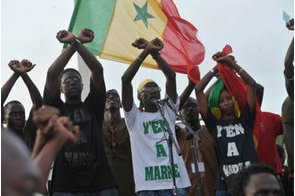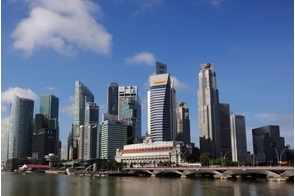U.S think tank advocates less taxes, fossil fuel and property rights for Africa to develop

Summary
Competitive Enterprise Institute proposes policies that promote economic freedom, limited government, affordable energy.
The Washington D.C.-based Competitive Enterprise Institute (CEI) has said Western approaches to development in Africa have neglected important reforms that would lead to meaningful development on the continent. In a report released today, CEI said the Western “poverty industry” – comprising of government agencies and nongovernmental organizations (NGOs) – fails to promote three key building blocks of prosperity: secure property rights, limited government, and affordable energy.
CEI said many African countries are among the poorest in the world, yet Western governments and NGOs waste time and resources advocating for foreign aid, crony projects, and costly, unreliable renewable energy sources that fail to spur economic growth and prosperity. The report, Economic Freedom is the Key to African Development, proposes policies that promote economic freedom, limited government, and affordable, plentiful energy.
“To help lift African nations out of poverty, we must promote reforms that secure property rights, reduce taxes and regulations, and, most importantly, increase access to energy that is affordable and reliable,” said Iain Murray, CEI Vice President for Strategy and co-author of the report.
Reducing taxes and regulations
The report argues that high taxes and prohibitive regulations discourage potential entrepreneurs from starting businesses and expanding them. Therefore, it urges a reduction in both of these government barriers, to encourage businesses from coming out of the shadow economy.
The shadow economy (or informal economy) in Sub-Saharan Africa accounts for about 50-80% of the region’s GDP, 60-80% of employment, and as much as 90% of new jobs. This shadow economy is the upshot of the stifling restrictions governments place upon businesses, CEI said. On average, an African entrepreneur is estimated to spend 54% of his or her annual income and take around 27 days to register a new business.
“Without the rule of law, it’s quite difficult to make a living, but people do it. They rely, not on the state, which is often a failure, but on traditional African customary law,” said Olumayowa Okdediran, a Nigerian political commentator quoted in the report.
CEI said informality is due to government policies that restrict economic liberty. By imposing burdensome barriers to marketplace entry, many governments prevent formalization. And as too many businesses operate outside the realm of government oversight, this impedes economic and job growth and excludes legal protections against fraud.
Establishing secure property rights
CEI said secure and strong property rights are a cornerstone of economic freedom. They enable individuals to trade, gain access to finance, and claim damages through the judicial system. However, African nations disproportionately lack secure, strong property rights, such as land titles that are secure from theft or corruption. This leaves people unable to leverage their assets to borrow money, start a business, or be protected against property damage or theft.
In Nigeria, the registration process for a property takes an average of 77 days and 10% of the value of the property. Rather than rely on outdated regulatory structures, the Washington D.C.-based advocacy group said African nations could follow in the footsteps of countries like the Republic of Georgia to establish land registry systems using blockchain technology. The blockchain is a widely accessible online public ledger that can log land titles digitally. It provides a more secure and efficient alternative to slow, bureaucratic government systems.
The CEI report shows that nations with the strongest private property protections have per capita incomes five times higher than those with only moderate protections. The CEI said blockchain titling programmes are currently being piloted in southern Ghana.
Increasing access to affordable, reliable energy
“With more than 620 million people lacking any access to electricity, energy poverty is a crushing reality for too many Africans,” said co-author Daniel Press, a CEI research associate. “Given this urgency, it is disappointing how few Africa advocates prioritize access to energy, especially low-cost fossil fuel.”
The huge shortage of electricity forces people to burn wood for cooking and heating, leading to deforestation and indoor air pollution. These practices are responsible for over 600,000 deaths across the continent each year, according CEI.
Economic development requires affordable, plentiful energy, CEI noted in its new report. Energy policies should prioritize reliable, affordable, readily available energy sources over politically-correct energy sources.
The report maintains that the current emphasis on developing Africa through low-emission renewable energy technologies to mitigate climate change has two problems. One, current technology renders renewable energy both inefficient and expensive, especially for large scale industrialization. Two, the perceived costs of climate change, assuming they are correct, do not outweigh the benefits of a developed Africa.
"Africa does not need small-scale off-grid solutions. It needs extensive, reliable energy sources to drive a modern economy of industry, agriculture, and services," authors of the CEI report said. "Forcing an energy impoverished continent onto an energy diet would be highly destructive."
CEI said renewable energy advocates tend to focus on the costs associated with fossil fuels, while neglecting the fact that the economic growth these energy sources bring increases the ability to innovate, adapt to changes, and even improve the environment.
The authors of the report call on African policymakers to invest in resources that can spur their development most effectively.
Related
-
AfriDocs presents documentaries shining light on corruption, oppression in Africa
The films have received numerous awards for shining the light on various civil-society movements across Africa.
-
Italy’s largest union brings 200,000 to Rome for work, democracy protest
Workers, retirees, and young people filled the streets to call for a fairer Italy – one founded on the dignity of ...
-
Revised ICGN Global Governance Principles approved
The revision includes focus on looking at companies and corporate governance holistically in terms of financial, natural ...









